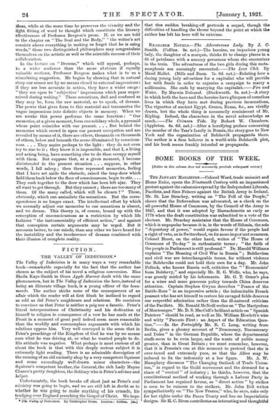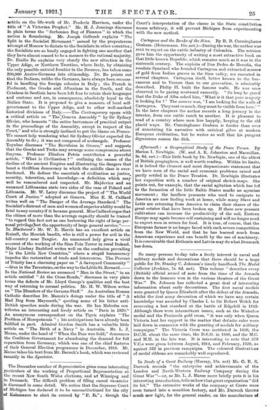SOME BOOKS OF THE WEEK.
INotlee in this column does not necessarily preclude subsequent review.]
THE JANUARY MAGAZINES.—Colonel Ward, trade unionist and Home Ruler, opens the Nineteenth Century with an impassioned protest against the calumnies spread by the Independent Liberals, Pacifists, and Sinn Feiners against the British Army in Ireland. Mr. St. Loe Strachey, writing on " The Poll of the People," shows that the Referendum was advocated, as a check on the all-powerful House of Commons, by the Council of the Army in 1647, and that it was adopted by Massachusetts as early as 1778 when the draft constitution was submitted to a vote of the electors. Mr. Strachey maintains that the House of Commons, which is unpopular because it is, in the words of Sidonia, the sole "depository of power," would regain favour if the people had a right of veto, as in Switzerland, on its more important measures. Colonel Hurst, on the other hand, writes of " The House of Commons of To-day " in enthusiastic terms ; " the faith of the people in Parliament is still profound." Dr. Harold Williams explains " The Meaning of Civil War in Russia " ; Bolshevism and civil war are interchangeable terms, for without violence the Bolsheviks could not hold their own for a day. Mr. John Pollock, who knows Russia well, criticizes the " ' Economists' from Bolshevy," and especially Mr. H. G. Wells, who, he says, was grossly misled by his informants. Mr. G. T. Orme's plea for a wiser and more generous policy towards China deserves attention. Captain Stephen Gwynn describes " France of the Battle-Zone " in an impressive article ; the indomitable French peasant who has set himself to restore his ravaged fields deserves our respectful admiration rather than the ill-natured criticism of the Pacifists. Mr. Ronald McNeill writes on " The Martyrdom of Montenegro." Mr. D. S. MacColl's brilliant article on "Spanish Painters " should be read, as well as Mr. William Hewlett's wise and witty " Parents First : an Aspect of the Education Ques- tion."—In the Fortnightly Mr. R. C. Long, writing from Berlin, gives a gloomy account of " Democracy, Bureaucracy and Doles " in the German Republic, where the departmental staffs seem to be even larger, and the waste of public money greater, than in Great Britain ; we must remember, however, that it is Prussia's cue at this moment to pretend that she is over-taxed and extremely poor, so that the Allies may be induced to fix the indemnity at a low figure. Mr. A. W. Humphrey discusses " The Changing Outlook of Trade Union- ism," in regard to the Guild movement and the demand for a share of " control " of industry ; he thinks, however, that the constitutional method of working through a Labour Party in Parliament has regained favour, as "direct action" by strikes is seen to be ruinous to the strikers. Mr. John Bell writes sympathetically on " The New France," who, he says, asks only for her rights under the Peace Treaty and has no Imperialistic designs. Sir H. C. Biron contributes an interesting and thoughtful article on the life-work of Mr. Frederic Harrison, under the title of " A Victorian Prophet." Mr. H. J. Jennings discusses In plain terms the " Serbonian Bog of Finance " in which the nation is floundering. Mr. Joseph Gollomb explains " The Split in the Socialist Movement " caused by the preposterous attempt of Moscow to dictate to the Socialists in other countries ; the Socialists are so busily engaged in fighting one another that they have almost ceased to be a menace to the rational majority. Dr. Emilio Re explains very clearly the new situation in the Upper Adige, or Northern Trentino, where Italy, by obtaining the only possible natural frontier in the Brenner, has taken some 200,000 Austro-Germans into citizenship. Dr. Re points out that the Italians, unlike the Germans, have always been success- ful in handling the foreign colonies in Italy ; the French in Piedmont, the Greeks and Albanians in the South, and the Catalans in Sardinia have been left free to retain their languages and customs and are, in consequence, absolutely loyal to the Italian State. It is proposed to give a measure of local self- government to the Upper Adige, and to other well-marked historical divisions of Italy.—The Contemporary opens with a critical article on " The:Geneva Assembly " by Sir Sydney Olivier, who laments " the entire barrenness of practical output in the proceedings of the Assembly, except in respect of the Court," and who is strongly inclined to put the blame on France. We cannot help wondering what Sir Sydney Olivier expected the Assembly to do ; it was not composed of archangels. Professor Toynbeo discusses " The Revulsion in Greece," and suggests that the Greeks and Turks may arrange some compromise about Smyrna. Professor Flinders Petrie contributes a powerful article, " What is Civilization " outlining the causes of the decline of the ancient Empires and illustrating the dangers that beset a thriftless democracy in which the middle class is over- burdened. He defines the essentials of civilization as justice, security, toleration, and knowledge—a definition which may well be remembered and respected. Mr. Majdevicz and an unnamed Lithuanian state two sides of the case of Poland and Lithuania. Mr. W. Latey discusses the project of " The World Court of Justice " adopted at Geneva. Miss E M. Caillard writes well on " The Danger of the Average Standard." The Socialist's distrust of men and women of superior ability would be fatal to any country if it became general. Miss Caillard urges that the citizen of more than the average capacity should be trained "to regard this fact not as one bestowing the right of large per- sonal privilegebut the opportunity of large general service."
In Blackwood's Mr. W. B. Harris has an excellent article on Raisull, the Moorish bandit, who is still a power for evil in the hill-country near Tangier. An unnanmed lady gives a vivid account of the working of the Sinn Fein Terror in rural Ireland. Major Lindsay Bashford writes well on the confusion prevailing " In the Little New Countries," where a stupid bureaucracy impedes the restoration of trade and intercourse. The Provost of Trinity has a charming paper on " A Savoyard Community " —S6ez in the Tarentaise, on the way to theLittle St. Bernard.
In the National Review an unnamed " Man in the Street," in an article entitled " At the Cross-Roads," discusses in very plain terms the defects of Mr. Lloyd George's qualities and the best way of returning to normal politics. Mr. H. W. Wilson writes on " The Blunders of the German Staff." An Australian Roman Catholic describes Dr. Mannix's doings under the title of " A Mad Dog from Maynooth," quoting some of his bitter anti- British speeches made during the war. Sir Ian Malcolm con tributes an interesting and lively article on " Paris in 1920." An anonymous correspondent on the Tigris explains " The Problem of Mesopotamia " ; his anticipations have already been fulfilled in part. Admiral Gordon Smith has a valuable little article on " The Birth of a Navy " in Australia. Mr. L. J. Maxse, under the head of " When the Pass was Sold," denounces the Coalition Government for abandoning the demand for full reparation from Germany, which was one of the chief features of their General Election programme in December, 1918. Mr. Maxse takes his text from Mr. Baruch's book, which was reviewed recently in the Spectator.











































 Previous page
Previous page